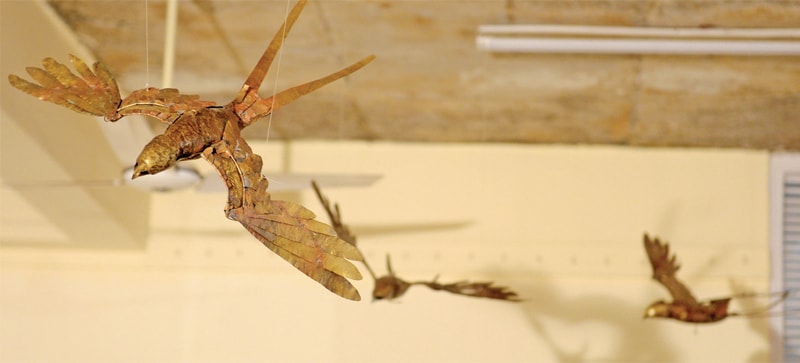RAWALPINDI: In the aftermath of any disaster or conflict, rebuilding homes is seen as the most important way to restore normalcy to any ravaged community. But the rehabilitation of the people who will occupy these new homes; those who have to live with trauma, is just as essential for normalisation as material assistance.
It was in this spirit that the National College of Arts (NCA) in Rawalpindi hosted ‘Value of Culture in Conflict’, an exhibition based on a research project that aimed to promote “income generation through culturally relevant craft activities which lead to poverty alleviation and, in the long run, the reconstruction of a conflict-worn state and economy”.
By promoting the engagement of women from conflict-stricken areas, this project aims at imparting skills that allow them to generate income, which makes the reconstruction process easier.
Exhibit at NCA Rawalpindi showcases embroidery by women from villages along LoC
Inaugurated by Federal Minister for Education Balighur Rehman, the exhibit was a rare display of research-based academic work by the art school, which has undergone a transformation in recent months. Housed in the newly-built academic block, the exhibit was tastefully displayed making full use of the space available.
Dr. Neelam Raina from the Middlesex University’s Department of Design, who led this project, explained the ethos behind her work.

“When a community faces intractable challenges, caused either by conflict or natural disaster, their response depends on how resilient they are. This project looks at ...how they see themselves and their environment and how they frame their response to that particular situation,” she said.
She said that while natural disasters illicit an international reaction and there is a swift humanitarian response, the response is not the same in conflict situations because it is politically determined – which countries will support who and how much the local government will let outsiders interfere.
“Local communities’ response is quite prompt, as they are caught in the middle of the disaster,” she said, explaining their decision to work with women who were affected by the continuous violence on the Line of Control (LoC) in the Neelum Valley.
“We wanted to see how women in conflict areas use their cultural and coded, tacit knowledge to respond to the conflict in which they live and to support their socio-economic empowerment,” she said.
“Men respond differently to conflict than women; the bulk of responsibility of peace-building is often placed on the women of the region, exacerbating previously existing inequalities,” she pointed out.

When asked whether such projects could be used to rehabilitate those with psychological trauma, Dr Raina said: “There is a lot of literature about art as a therapeutic tool, there is also research on how to use art to counteract PTSD, but while this research draws from that, it doesn’t focus on it.”
NCA Principal Dr. Murtaza Jaffery told Dawn that the college was focusing on workshops that imparted practical skills to women from remote areas so that they could be empowered and made financially independent.
He stressed the importance of progressive work that involved the entire community and contributed to the facilitation of livelihoods, especially among women.
The exhibit features embroidery, done by women who live along the restive LoC. Curated by Fatima Hussein and organised by Zahra Hussein, a preview of the show was held on Tuesday before its public opening on Wednesday.
Published in Dawn, October 19th, 2017













































Dear visitor, the comments section is undergoing an overhaul and will return soon.